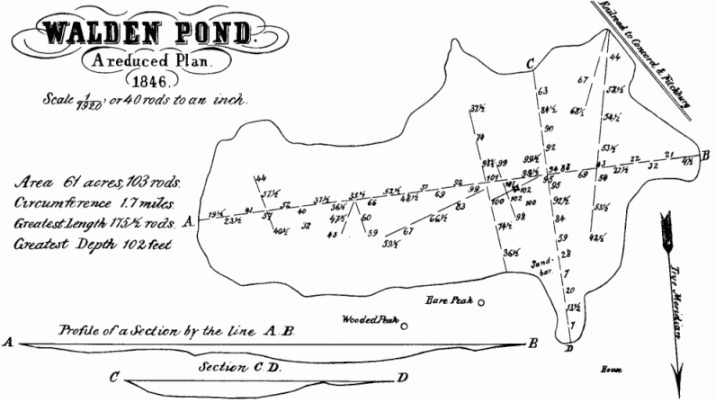Henry David Thoreau - Land Surveyor
It’s common knowledge that Henry David Thoreau wrote Walden about his two years living at Walden Pond (1845-1847). The book had an enormous impact at the time and its effects are still felt today.
The book includes this famous line: “the mass of men lead lives of quiet desperation . . .” He proposed a remedy — an inward-focused, simple life of study and observation that he believed provided fulfillment that a life in pursuit of accomplishment and material things could not match.
One of the things that Thoreau did while living at Walden pond (beyond recording his inner thoughts) was surveying Walden pond itself. Walden Pond was not his first survey — he had been “born” into surveying. At the time, it was a profession that did not require licensing and allowed him to spend time outdoors, observing and making notes.
Surveying for fun - and remuneration
Thoreau’s background as a surveyor helped to inform his world view and love of nature, though he was concerned that looking at the world with a surveyor’s eye might “affect my imagination and fancy”. Nevertheless, in 1851, he became Concord’s chief surveyor, playing an essential role as an adjudicator in public and private controversies related to land ownership. It’s likely he enjoyed the federally-sanctioned right to trespass for the purposes of surveying, which meant his long daily walks could be taken in any direction he chose without regard for whose land he might be enjoying.
Thoreau’s reservations about his occupation didn’t end at concern about its potential to constrain his imagination. He also was not a fan of capitalism, paid work or land ownership. His time as a paid surveyor likely produced some inner conflict as he settled local disputes over land ownership.
Despite this inner tension, he took his surveying equipment with him on walks, as he stated in Walden:
"For many years I was a self-appointed inspector of snow storms and rain storms, and did my duty faithfully; surveyors, if not of highways, then of forest paths and all across-lot routes."
Thoreau continued surveying later in life, especially the Concord River, where he charted the changes that industrialization and farming were making to the landscape.
Keen observational skills, ability to interpret and measure, accuracy and precision are all essential skills for surveyors. There is no doubt that these skills were foundational to Thoreau’s ability to see and understand his surroundings. Building upon that strong foundation, he wrote the “ultimate self-help book”.
Today, surveyors still rely on training, observation, reliable tools and quality marking products to leave a lasting mark on the world. For nearly a half-century, Berntsen has been right beside surveyors by providing the tools and products that are literally a monument to their work.
Sources:
https://issuu.com/discoverconcordma/docs/dc.fall22.fullbook/s/16741088
https://concordlibrary.org/special-collections/thoreau-surveys/107a
Walden's Ripple Effect | Arts & Culture| Smithsonian Magazine
https://thoreausociety.org/life-legacy/
https://plato.stanford.edu/entries/thoreau/
http://americanscience.blogspot.com/2012/11/henry-david-thoreau-scientist.html


